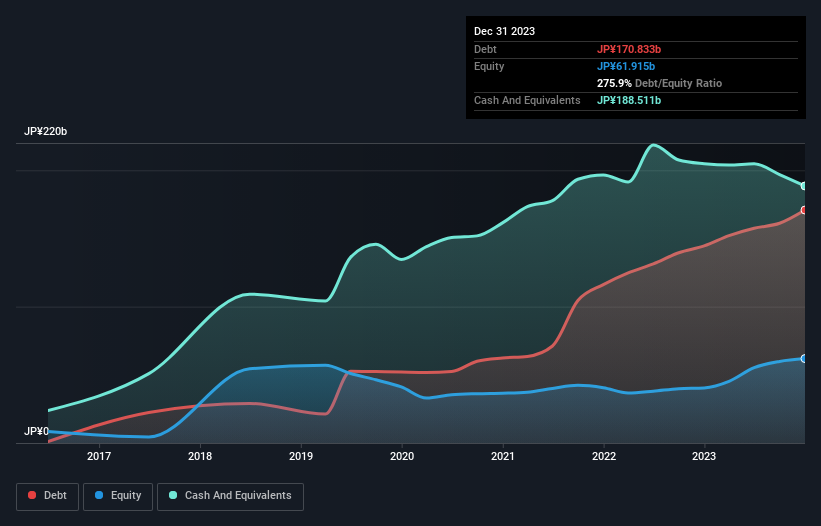Is Mercari (TSE:4385) A Risky Investment?

Legendary fund manager Li Lu (who Charlie Munger backed) once said, 'The biggest investment risk is not the volatility of prices, but whether you will suffer a permanent loss of capital.' So it might be obvious that you need to consider debt, when you think about how risky any given stock is, because too much debt can sink a company. We can see that Mercari, Inc. (TSE:4385) does use debt in its business. But should shareholders be worried about its use of debt?
When Is Debt A Problem?
Debt assists a business until the business has trouble paying it off, either with new capital or with free cash flow. In the worst case scenario, a company can go bankrupt if it cannot pay its creditors. However, a more common (but still painful) scenario is that it has to raise new equity capital at a low price, thus permanently diluting shareholders. Of course, plenty of companies use debt to fund growth, without any negative consequences. When we examine debt levels, we first consider both cash and debt levels, together.
View our latest analysis for Mercari
How Much Debt Does Mercari Carry?
The image below, which you can click on for greater detail, shows that at December 2023 Mercari had debt of JP¥170.8b, up from JP¥144.6b in one year. But it also has JP¥188.5b in cash to offset that, meaning it has JP¥17.7b net cash.

How Healthy Is Mercari's Balance Sheet?
We can see from the most recent balance sheet that Mercari had liabilities of JP¥261.4b falling due within a year, and liabilities of JP¥133.3b due beyond that. On the other hand, it had cash of JP¥188.5b and JP¥165.8b worth of receivables due within a year. So its liabilities outweigh the sum of its cash and (near-term) receivables by JP¥40.3b.
Given Mercari has a market capitalization of JP¥285.0b, it's hard to believe these liabilities pose much threat. But there are sufficient liabilities that we would certainly recommend shareholders continue to monitor the balance sheet, going forward. Despite its noteworthy liabilities, Mercari boasts net cash, so it's fair to say it does not have a heavy debt load!
Even more impressive was the fact that Mercari grew its EBIT by 388% over twelve months. If maintained that growth will make the debt even more manageable in the years ahead. The balance sheet is clearly the area to focus on when you are analysing debt. But it is future earnings, more than anything, that will determine Mercari's ability to maintain a healthy balance sheet going forward. So if you want to see what the professionals think, you might find this free report on analyst profit forecasts to be interesting.
Finally, while the tax-man may adore accounting profits, lenders only accept cold hard cash. Mercari may have net cash on the balance sheet, but it is still interesting to look at how well the business converts its earnings before interest and tax (EBIT) to free cash flow, because that will influence both its need for, and its capacity to manage debt. During the last three years, Mercari burned a lot of cash. While investors are no doubt expecting a reversal of that situation in due course, it clearly does mean its use of debt is more risky.
Summing Up
Although Mercari's balance sheet isn't particularly strong, due to the total liabilities, it is clearly positive to see that it has net cash of JP¥17.7b. And it impressed us with its EBIT growth of 388% over the last year. So we don't have any problem with Mercari's use of debt. Above most other metrics, we think its important to track how fast earnings per share is growing, if at all. If you've also come to that realization, you're in luck, because today you can view this interactive graph of Mercari's earnings per share history for free.
When all is said and done, sometimes its easier to focus on companies that don't even need debt. Readers can access a list of growth stocks with zero net debt 100% free, right now.
New: Manage All Your Stock Portfolios in One Place
We've created the ultimate portfolio companion for stock investors, and it's free.
• Connect an unlimited number of Portfolios and see your total in one currency
• Be alerted to new Warning Signs or Risks via email or mobile
• Track the Fair Value of your stocks
Have feedback on this article? Concerned about the content? Get in touch with us directly. Alternatively, email editorial-team (at) simplywallst.com.
This article by Simply Wall St is general in nature. We provide commentary based on historical data and analyst forecasts only using an unbiased methodology and our articles are not intended to be financial advice. It does not constitute a recommendation to buy or sell any stock, and does not take account of your objectives, or your financial situation. We aim to bring you long-term focused analysis driven by fundamental data. Note that our analysis may not factor in the latest price-sensitive company announcements or qualitative material. Simply Wall St has no position in any stocks mentioned.
About TSE:4385
Mercari
Plans, develops, and operates Mercari marketplace applications in Japan and the United States.
Adequate balance sheet with moderate growth potential.
Similar Companies
Market Insights
Community Narratives




